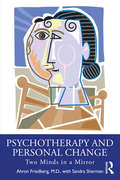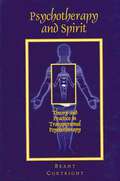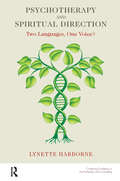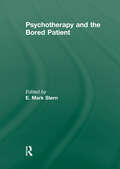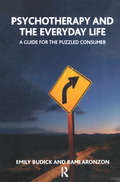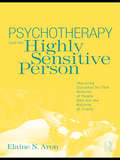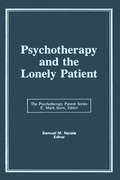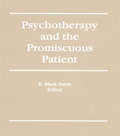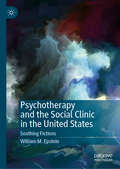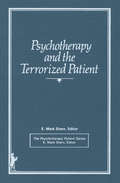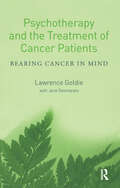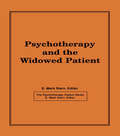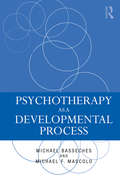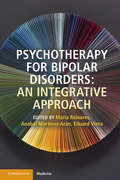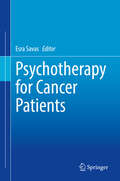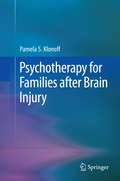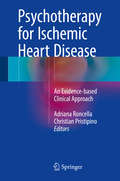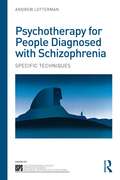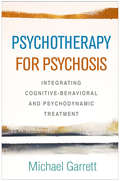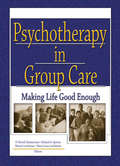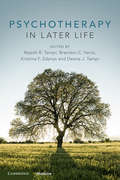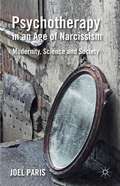- Table View
- List View
Psychotherapy and Personal Change: Two Minds in a Mirror
by Ahron Friedberg Sandra ShermanPsychotherapy and Personal Change: Two Minds in a Mirror offers unique day-to-day accounts of patients undergoing psychotherapy and what happens during "talk therapy" to startle the complacent, conscious mind and expose the unconscious. It is a candid, moment-by-moment revelation of how the therapist’s own memories, feelings, and doubts are often as much a factor in the process as those of the patient. In the process of healing, both the therapist and the patient reflect on each other and on themselves. As the therapist develops empathy for the patient, and the patient develops trust in the therapist, their shared memories, feelings, and associations interact and entwine – almost kaleidoscopically – causing each to ask questions of the other and themselves. In this book, Dr. Friedberg reveals personal insights that arose as he recalled memories to share with patients. These insights might not have arisen but for the therapy, which operates in multiple directions as patient and therapist explore the present, the past, and the unknown. Readers will see the therapist – like the patient – as a complex, vulnerable human being influenced by parents, colleagues, and friends, whose conscious and unconscious minds ramify through each other. It is a truism of psychotherapy that in order to commit to the process, whatever the reservations or misconceptions, one must understand that therapy is not passive. The patient must expect to become personally involved with the therapist. The patient learns about the therapist even as the therapist helps the patient to gain insight into him- or herself. Psychotherapy and Personal Change shows how this exchange develops and how each actor is affected. Through specific examples, the book raises the reader’s understanding of what to expect from psychotherapy and enhances his/her insight into therapy that he or she may have had already.
Psychotherapy and Religion in Japan: The Japanese Introspection Practice of Naikan (Japan Anthropology Workshop Series)
by Chikako Ozawa-de SilvaNaikan is a Japanese psychotherapeutic method which combines meditation-like body engagement with the recovery of memory and the reconstruction of one's autobiography in order to bring about healing and a changed notion of the self. Based on original anthropological fieldwork, this fascinating book provides a detailed ethnography of Naikan in practice. In addition, it discusses key issues such as the role of memory, autobiography and narrative in health care, and the interesting borderland between religion and therapy, where Naikan occupies an ambiguous position. Multidisciplinary in its approach, it will attract a wide readership, including students of social and cultural anthropology, medical sociology, religious studies, Japanese studies and psychotherapy.
Psychotherapy and Spirit: Theory and Practice in Transpersonal Psychotherapy (SUNY series in the Philosophy of Psychology)
by Brant CortrightThis volume brings together the major developments in the field of transpersonal psychotherapy. It articulates the unifying theoretical framework and explores the centrality of consciousness for both theory and practice. It reviews the major transpersonal models of psychotherapy, including Wilber, Jung, Washburn, Grof, Ali, and existential, psychoanalytic,and body-centered approaches, and assesses the strengths and limitations of each. The book also examines the key clinical issues in the field. It concludes by synthesizing some of the overarching principles of transpersonal psychotherapy as they apply to actual clinical work.
Psychotherapy and Spiritual Direction: Two Languages, One Voice? (United Kingdom Council For Psychotherapy Ser.)
by Lynette HarborneThis book explores the similarities and differences between the practice of psychotherapy and spiritual direction and suggests that, whilst there may be distinctions between the two activities, the process is essentially the same. The purpose of the book is to improve the understanding between therapists and spiritual directors, to encourage dialogue and discussion between them, as well as to offer challenges and learning to both. In the process of exploring the interface between the practice of therapy and the practice of spiritual direction, questions arise about how to address issues of spirituality in a psychological context and psychological issues in a spiritual context. A brief overview of the historical background to spiritual direction is given, and attention drawn to the links between this tradition and the development of psychotherapy. Spiritual issues that may arise in therapy together with psychological issues that occur during spiritual direction are discussed, leading on to a comparison between 'dark night of the soul' experiences and clinical depression.
Psychotherapy and the Bored Patient
by E Mark SternThe specific guidelines to the clinical management of the bored or boring patient--offered in this provocative book--will be valuable to all psychotherapists. Contributors discuss the fascinating theories and therapies of boredom--why it is both a necessity and an obstacle to a person’s development. Fresh insights into the meaning of boredom for the patient or the therapist (or both) are presented through the discussion of such topics as the type of person most prone to boredom, boredom as a launching point into other experiences, boredom as a defense against strong affects and drive derivatives, the manifestations of boredom in marital therapy clients, and much more.
Psychotherapy and the Everyday Life: A Guide for the Puzzled Consumer
by Rami Aronzon Emily BudickThis book helps the patient of psychotherapeutic intervention to stay with the therapy beyond both the initial satisfactions and the initial frustrations that the process entails. It serves as a guide for patients of psychoanalytic or psychodynamic psychotherapy.
Psychotherapy and the Highly Sensitive Person: Improving Outcomes for That Minority of People Who Are the Majority of Clients
by Elaine N. AronDr. Elaine Aron’s newest book, Psychotherapy and the Highly Sensitive Person, redefines the term “highly sensitive” for the professional researcher and practitioner. She dispels common misconceptions about the relationship between sensitivity and other personality traits, such as introversion and shyness, and further defines the trait for the benefit of both the clinician and patient. Readers will learn to assess for the trait, distinguish it from clinical diagnoses such as panic disorder or avoidant personality disorder, understand how sensitivity may change the presentation of a problem such as depression or shyness, and generally inform, validate, and improve the quality of life for these clients. She pays particular attention to self-esteem issues and helping patients separate effects of their innate temperament from problems due to their personal learning histories. Dr. Aron keeps both patient and practitioner in mind as she suggests ways to adapt treatment for highly sensitive persons and how to deal with the typical issues that arise. Three appendices provide the HSP Scale, a summary of the extensive research on this innate trait, and its relation to DSM diagnoses. Through this helpful guide, therapists will see a marked improvement in their ability to assist highly sensitive clients.
Psychotherapy and the Lonely Patient
by E Mark Stern Samuel M NataleHere is an important new book focusing on the contribution of the therapist's love and empathy to the therapeutic process. Technique without dedication, discipline, and understanding will rarely benefit patients nor help resolve their conflicts. Psychoanalytic Technique demonstrates how the therapist's countertransference feelings, anxieties, wishes, and superego admonitions shape his or her therapeutic interventions.
Psychotherapy and the Promiscuous Patient
by E Mark SternLearn effective strategies for therapy with promiscuous patients from this in-depth exploration of the phenomenon of promiscuity in the lives and backgrounds of patients seeking psychotherapy. This unique book features insights about the pitfalls of patients who cannot bear commitment to any one person, or who jeopardize their commitments with a need to spark their lives with promiscuity. Psychotherapy and the Promiscuous Patient teaches psychotherapists to respond to their patients’promiscuous behavior as a symptom of a problem, not the problem itself. A realm of aspects of promiscuity are explored within the psychiatric context. Promiscuity is very broadly defined in fascinating examinations of adult promiscuity as a result of childhood sexual abuse, hypersexuality in adult males, addiction to the sensation of “falling in love,” career promiscuity, and even psychotherapy as an uncommon “promiscuity’--a nonexclusive, altruistic love. Timely chapters confront the changing distinctions between promiscuity and sex addiction and challenge readers to uncover the various emotional needs met by promiscuity in order to protect patients from their self-destructive behavior. Knowledgeable practicing psychotherapists relate methods for dealing with patients’constant restlessness and working with a variety of patients in an intimate setting. Psychotherapy and the Promiscuous Patient contains invaluable strategies that can be directly applied to practice including: the use of narrative construction and reconstruction as treatment for sexually promiscuous clients a self-psychological approach to treatment the importance of confusion as an introduction to change in therapy a method of self-investigation applied to promiscuous behavior the implications of the clinical meaning and therapeutic use of strong-laughter outbursts in psychology a self-psychology perspective on transference to therapistsPsychotherapy and the Promiscuous Patient is a valuable clinical book for psychotherapists, and it offers an across the board appeal to a wide variety of psychiatrists and related social scientists who are interested in today’s shifting moral climate. It is also an ideal supplemental text for an introductory methods or applications in psychiatry course.
Psychotherapy and the Quest for Happiness
by Emmy Van Deurzen"A passionate and thought-provoking book, particularly in our present economic climate" - Therapy Today, May 2009 "A vibrant, passionate, and hugely readable text which goes to the heart of the therapeutic project: how to help clients lead fuller and more meaningful lives" - Mick Cooper, Professor of Counselling at University of Strathclyde The unspoken yearning that brings people to therapy is often that of a desperate desire for happiness. Should therapists ignore this desire, interpret it or challenge it? And what does our preoccupation with happiness tell us about contemporary culture and the role of the therapist? In this book, Emmy van Deurzen addresses the taboo subject of the moral role of psychotherapists and counsellors. Asking when and why we decided that the aim of life is to be happy, she poses searching questions about the meaning of life. Psychotherap y and the Quest for Happiness seeks to define what a good life consists of and how therapists might help their clients to live well rather than just in search of happiness. This text makes stimulating reading for all trainee and practising counsellors and psychotherapists, especially those interested in the existential approach. Emmy van Deurzen is Co-Director of the Centre for the Study of Conflict and Reconciliation, and honorary Professor at the School of Health and Related Research, University of Sheffield
Psychotherapy and the Social Clinic in the United States: Soothing Fictions
by William M. EpsteinThis book offers a compelling critical analysis of American society by examining the role of psychotherapy within social policy and the culture that has fashioned it. It takes a deeply critical look at ‘the social clinic,’ defined here as a ubiquitous organizational arrangement that includes clinical and community psychology, counseling, clinical social work, psychiatry, much of the self-help industry, complementary and alternative medicine and others. Epstein’s analysis concludes that the social clinic lacks credible evidence of effectiveness and its continued popularity expresses popular but predatory American values such as romantic individualism, the triumph of the subjective, a sense of personal and political chosenness, persistent bigotry, and a preference for tribal as opposed to civic identities. This careful examination of American society through the lens of psychotherapeutic practice characterizes the social clinic as a soothing fiction of the United States.The book offers caring services as the unrealized alternative to clinical treatment, capable of achieving greater personal adjustment as well as social and economic equality. It will appeal to readers with an interest in social welfare, public policy, and public administration, as well as to students and scholars of psychotherapy, counseling, social work, rehabilitation, and community psychology.
Psychotherapy and the Terrorized Patient
by E Mark SternSuccessful interventions for helping terrorized patients cope with and overcome the pangs of uncertainty and dread which they experience constantly.
Psychotherapy and the Treatment of Cancer Patients: Bearing Cancer in Mind
by Jane Desmarais Lawrence GoldiePsychotherapy and the Treatment of Cancer Patients addresses the need for a more integrated care of cancer patients within hospitals which pays attention to the mental anguish as well as physical distress caused by the disease. This book is based on Lawrence Goldie's own research with cancer patients, which has shown that psychoanalytic psychotherapy together with general medical care can significantly help dying patients cope with the pain and suffering associated with the disease. Drawing on this research, the book advocates a more holistic approach to the cancer patient and suggests ways in which more expert attention might be provided through awareness, training and resources. The book describes the innovative approach of applying the psychoanalytic psychotherapeutic approach within the hospital context to help individuals cope with cancer. As well as an overview of cancer and the therapeutic approach, topics covered include: * the impact of cancer on hospital relationships * cancer in different areas of the body and mind * ‘mind-bending pain’ * dread and trauma - on being told the truth * psychoanalytic psychotherapy in the NHS 'general' hospital * examining group processes in hospital. Psychotherapy and the Treatment of Cancer Patients challenges the existing orthodoxies about palliative care and points to ways in which the principles and methods of psychoanalysis can be applied successfully to cancer care within the hospital context.
Psychotherapy and the Widowed Patient
by E Mark SternComing at a time of renewed interest in the developmental changes of the life cycle, Psychotherapy and the Widowed Patient is a rich resource that examines the impact of a spouse's death on an individual's mental health. Psychiatrists and psychoanalysts address a wide range of issues concerning loss, grief, and bereavement, and provide practical and creative approaches for both widowed persons and the helping professionals charged with treating their grief. Chapters in this compassionate volume discuss the characteristics of individuals who are more likely to seek professional help in coping with grief, widowhood as a time of growth and development, the value of openness instead of denial in dealing with death, the grieving process in young widowed spouses, the similarities of widowhood to separation and divorce, the role of dependency in how well widowed patients develop emotionally, and the role of loyalty in the process of grief. The more clinical chapters examine strategies for carrying out experiential psychotherapy with widowed patients, rational-emotive therapy, grief therapy, the effects of new perspectives on spousal bereavement on clinical practice, and aspects of bereavement response to loss, with a timeframe for viewing psychotherapeutic intervention. A review of the psychological literature regarding widowhood completes this comprehensive new book.
Psychotherapy as a Developmental Process
by Michael Basseches Michael F. MascoloFor all those engaged in psychotherapy practice, regardless of modality or approach, the goal of this book is to provide a framework and method for thinking about their work that allows for critical reflection on their own successes and disappointments, and on the similarities and differences among their own and other practitioners’ work with different clients. The authors use a novel "common factors" approach, based on the idea that some form of development is the outcome of all effective psychotherapy, despite other differences that may exist. While most existing psychotherapy research focuses on treatment outcomes, primarily in terms of symptom reduction, this book offers an alternative research approach that systematically tracks the psychotherapy process itself, and describes each case’s unique developmental outcome. In particular, Basseches & Mascolo focus on the questions of what kinds of therapeutic resources therapists are offering to their clients and whether and how clients are able to make use of these resources in the service of their own development. The goal is to provide a descriptive framework that can be used to appreciate the highly varied ways in which particular therapists tailor their work to unique clients’ developmental needs, while at the same time offering a prescription of a more rigorous method for recognizing and correcting the problem when a particular therapist’s way of working is not serving the client well. Ideally, this type of process-focused research will complement existing outcome research, and be more likely than further symptom-reduction studies to result in the improvement of overall psychotherapy success rates.
Psychotherapy for Bipolar Disorders: An Integrative Approach
by Eduard Vieta Maria Reinares Martínez-Arán AnabelWhile medication is hugely important in treating bipolar disorders, an integrated approach which utilizes psychological treatments can target some aspects that medication alone cannot reach. A comprehensive review of evidence-based psychological treatments is provided, followed by practical information on psychoeducation for patients and family members, healthy lifestyle promotion, mindfulness-based interventions and cognitive and functional remediation, as they represent the basis on which the integrative approach is developed. The second half of the book provides examples of sessions of integrative therapy, which can be shared with patients themselves, enhancing the effectiveness of applying the treatment. Psychotherapy for Bipolar Disorders: An Integrative Approach offers a brief but multi-component treatment framework that can also be implemented in non-specialized health centres. This approach may greatly improve the well-being and quality of life of people with bipolar disorders. This accessible text is an essential resource for psychiatrists, clinical psychologists and any healthcare provider working in mental healthcare.
Psychotherapy for Cancer Patients
by Esra SavaşThis integrative volume is designed as a full resource for the psychological issues associated with cancer. Experts in a variety of areas (oncology. psychiatry, psychology, medicine, and social work) bring their insights to bear on treatment of the complex issues of cancer treatment. A range of therapy strategies are discussed, as well as varieties of therapeutic modalities. Included are evidence-based strategies for effective care for both individual and group settings. Attention is also given to care beyond the patient, including families and care givers. This volume is a comprehensive guide to providing psychotherapy in tandem with other cancer treatments and is essential guide to the present practical concerns as well as future research directions.
Psychotherapy for Families after Brain Injury
by Pamela S. KlonoffWhether caused by illness, accident, or incident, brain injury requires multi-tiered resources for the patient and considerable external care and support. When recovery is sidelined by depression, anger, grief, or turmoil, family members and the support network have critical roles to play and need their own guidance and compassionate therapeutic interventions. Psychotherapy for Families after Brain Injury offers theoretical frameworks and eclectic techniques for working effectively with adult patients and their families at the initial, active and post-treatment phases of rehabilitation. This practical reference clarifies roles and relationships of the support network in interfacing with the loved one and addresses the understandably devastating and sometimes derailing emotions and psychosocial adversities. The content promotes psychoeducation and guided exercises, delineates "helpful hints" and coping tools and proffers multimedia resources to overcome hurdles Constructs of awareness, acceptance and realism for all parties are woven throughout, along with ideas to enhance the support network's commitment, adjustment, positivity, hope and longevity. Case excerpts, instructive quotes from caregivers and nuggets of clinical advice assist in analyzing these and other topics in salient detail: The impact of brain injury on different family members. Treatment themes in early family sessions. Family therapy for moderate to severe brain injury, concussion and postconcussion syndrome. Family therapy after organic brain injury: stroke, anoxia, tumor, seizure disorders. Family group treatment during active rehabilitation. End-of-life and existential considerations and positive aspects of care giving. Aftercare group therapy for long-term needs. The hands-on approach demonstrated in Psychotherapy for Families after Brain Injury will enhance the demanding work of a range of professionals, including neuropsychologists, clinical psychologists, rehabilitation psychologists, family therapists, marriage and family counselors, psychiatrists, behavioral/mental health counselors, clinical social workers, rehabilitation specialists such as speech-language pathologists, physical and occupational therapists, and graduate students in the helping professions.
Psychotherapy for Immigrant Youth
by Daryn Reicherter Sita PatelThis book provides an in-depth, practical, and cutting-edge summary of psychotherapy for immigrant children and adolescents. This text integrates practical therapeutic methods with current empirical knowledge on the unique life stressors and mental health concerns of immigrant youth, proving essential for all who seek to address the psychological needs of this vulnerable and under-served population. Specific chapters are devoted to trauma, refugees and forced displacement, cognitive-behavioral therapy, psychopharmacological issues, school-based treatment, family. Each chapter includes specific cultural concerns and treatment techniques for immigrant groups from various regions of the world. In-depth case examples illustrate case formulation, how and when to use specific techniques, challenges faced in the treatment of immigrant youth, and responses to common obstacles. With detailed theory and practice guidelines, Psychotherapy for Immigrant Youth is a vital resource for psychologists, psychiatrists, social workers, and other practitioners.
Psychotherapy for Ischemic Heart Disease
by Adriana Roncella Christian PristipinoThis book discusses the benefits of application of different psychotherapy techniques, in addition to optimal medical approaches, in patients with ischemic heart disease. It explains the theoretical basis for use of these techniques, discusses the scientific evidence for their efficacy, and identifies important practical issues. Detailed attention is devoted to both well-established and recently developed approaches of proven value, as well as to future applications. In addition, practical insights are provided into the most effective ways of integrating psychotherapy with medical activities in hospitals, outpatient clinics, and rehabilitation centers. The authors are world experts in the fields of psychotherapy, pharmacology, and cardiology, who collectively provide a sound foundation for an interdisciplinary approach to patients with ischemic heart disease. Psychotherapy for Ischemic Heart Disease is both a textbook and a practical manual aimed particularly at cardiologists, psychologists, psychotherapists, and psychiatrists, but also internal medicine specialists, cardiac surgeons, general practitioners, rehabilitation doctors, students, nurses, and patients.
Psychotherapy for People Diagnosed with Schizophrenia: Specific techniques (The International Society for Psychological and Social Approaches to Psychosis Book Series)
by Andrew LottermanIn this unique book, Andrew Lotterman describes a creative approach to the psychotherapy of people diagnosed with schizophrenia and other forms of psychosis. Lotterman focuses on specific techniques that can be used in psychological therapy with people who have symptoms such as hallucinations, delusions, paranoia, ideas of reference, looseness of association and pressured speech. Formerly titled Specific Techniques for the Psychotherapy of Schizophrenic Patients, this edition updates research on the biology and psychology of psychosis and explores the many controversial issues surrounding diagnosis. It also includes two new chapters on the psychology and treatment of paranoia and on the experience of having a shattered self and the delusion of being the Messiah. Lotterman’s innovative approach aims to help patients with one of the most debilitating symptoms of psychosis: the collapse of language use. By restoring language as a way of communicating the patient’s meaningful inner life to himself and to others, the patient is then able to undertake a more traditional form of verbal psychotherapy. The book presents detailed case histories of patients who have benefited from this method, highlighting the specific techniques used and the psychological improvements that followed. The approach presented here complements medication-based treatments that have only had partial success, as well as other psychological approaches such as cognitive behavioural therapy, family therapy and social skills training. Psychotherapy for People Diagnosed with Schizophrenia will be a valuable text for clinicians working with people suffering from psychosis, including psychotherapists, psychoanalysts, psychologists, physicians and social workers. It will also be of great interest to academics and students.
Psychotherapy for Psychosis: Integrating Cognitive-Behavioral and Psychodynamic Treatment
by Michael GarrettIn this innovative book, master clinician Michael Garrett shows how to weave together cognitive-behavioral therapy (CBT) and psychodynamic therapy to support the recovery of persons suffering from psychosis. This integrated framework builds on the strengths of both methods to achieve lasting gains, even for patients with severe, chronic mental illness. The therapist is guided to use CBT to help the patient recognize the literal falsity of delusions, while employing psychodynamic strategies to explore the figurative truth and personal meaning of psychotic symptoms. Extended case presentations and numerous clinical vignettes illustrate Garrett’s compassionate, empowering approach.
Psychotherapy in Group Care: Making Life Good Enough
by D Patrick Zimmerman Richard A. Epstein Jr Martin Leichtman Maria LeichtmanIntegrate psychotherapy with residential treatment to achieve positive results for patients in group care! This book addresses the complex issues that arise in the effort to provide individual therapy in group care settings. It reviews classical case material, presents contemporary case studies, and examines practical and theoretical issues important to the effective delivery of treatment to individuals living in residential care. Noted experts who have been associated with The Sonia Shankman Orthogenic School at the University of Chicago and the Menninger Clinic in Topeka, Kansas, share knowledge garnered from years of real-world experience to help you stay at the leading edge of the field and provide effective individual treatment to your clients in long- and short-term residential care. Psychotherapy in Group Care: Making Life Good Enough includes practical and theoretical chapters exploring important aspects of the group care paradigm. The book: presents a case study that describes vital aspects of the analytic process that emerged in work with an adolescent boy in a group home who felt as though he was a psychological orphan illustrates the role of play as a continuous and basic function in therapy and presents play-themed vignettes from analytic work with two young people in residential care revisits "Joey: A Mechanical Boy" and "Tommy the Space Child"-classic case studies from Bruno Bettelheim and Rudolph Ekstien-and explores the implications of contemporary relational theory for using the meaning and metaphor of behaviors and communications addresses issues of transference and counter-transference in the psychodynamic psychotherapy of a young girl in residential care-with a discussion of unrecognized rescue fantasies and projective identification, and of the need for residential childcare workers to recognize and work through the difficult feelings evoked in the process of working with seriously disturbed young people examines the structural basis for the integration of psychotherapy and residential treatment, considering the meaning of integration, variables that affect the manner and degree to which integration can be accomplished, and changes in the psychotherapists' roles that can maximize the potential of each variable explores three sets of theoretical issues facing clinicians as they play multiple roles in short-term residential treatment, discussing how conflicts in the roles of therapists and team leaders can be resolved, the implications of such a resolution in terms of confidentiality, and ways in which major approaches to psychotherapy can be adapted to new conditions considers the role of the primary clinician in relation to the residential team and explores the ways in which integration of psychotherapy and residential treatment can be implemented in the early phase of the treatment process
Psychotherapy in Later Life
by Rajesh R. Tampi Deena J. Tampi Brandon C. Yarns Kristina F. ZdanysPsychotherapy in Later Life is a practical how-to-guide for psychiatrists, psychologists and mental health workers on choosing and delivering evidence-based psychological therapies to older adults. It covers all the main evidence-based psychological therapies such as cognitive behavioural therapy (CBT) and interpersonal psychotherapy (IPT), as well as specialist topics such as combining psychotherapy with pharmacological treatments, working with diverse populations and individual versus group therapy. The World Health Organization estimates that over the next four decades, the proportion of the world's older adults will nearly double, from twelve percent to twenty-two percent, and that one in five older adults has a diagnosable mental health disorder. Given the increasing number of older adults requiring mental health treatment, incorporating talking therapies into treatment plans is key to tackling issues related to polypharmacy, medication interactions and side effects. Written by experts in geriatric mental health, this book provides the most authoritative information on the use of psychotherapy in older adults.
Psychotherapy in an Age of Narcissism
by Joel ParisAdopting a friendly but critical approach to the talking therapies, this book places psychotherapy in a social and historical context, exploring its relationship to contemporary culture and recommending a different way of thinking about practice.
